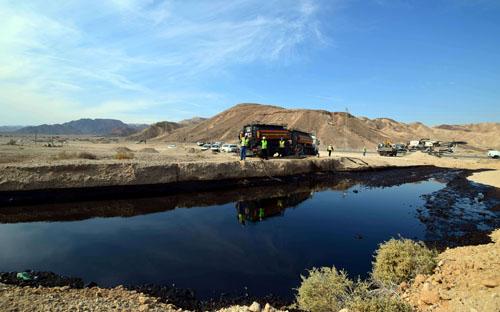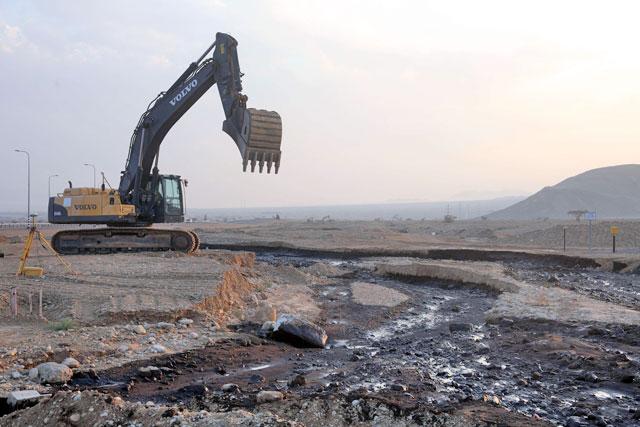You are here
Oil fumes from ruptured pipeline in Israel spread to Aqaba
By Hana Namrouqa - Dec 04,2014 - Last updated at Dec 04,2014

AMMAN — An oil spill in southern Israel near the Jordanian border on Wednesday night created a state of panic among Aqaba residents, dozens of whom went to hospitals after suffering from shortness of breath, according to officials.
An oil pipeline rupture caused thousands of cubic metres of crude oil to spill into the desert in southern Israel just north of the Israeli Red Sea resort city of Eilat and 500 metres from the border with Jordan, according to Agence France-Presse (AFP).
Medical staff at two of Aqaba’s main hospitals said their emergency rooms received about 170 people suffering from shortness of breath.
Prince Hashem Bin Abdullah Military Hospital Director Ebrahim Amr said the emergency room received 70 to 75 patients, noting that the majority of them did not require medical treatment.
“People were coming to the hospital because they were panicked by the smell of the gas. Most of them were discharged within half an hour,” Amr told The Jordan Times on Thursday.
A doctor at the Islamic Hospital in Aqaba told The Jordan Times that the emergency room received 80 to 84 patients.
“They were treated for shortness of breath and accelerated heartbeat, especially those who suffer from asthma and allergies,” added the doctor, who preferred to remain unnamed.
In a statement e-mailed to The Jordan Times, the Aqaba Civil Defence Department (CDD) said its gas detectors showed that there was a concentration of a type of gas found in crude oil.
CDD personnel scoured the city for two hours in search of the source, but could not find any signs of a gas leak, the statement said.
“After further inspection, it was evident that the source of the gas was Eilat, where a vehicle rammed into a crude oil pipeline,” the CDD added.
An Aqaba resident who works in the Ibn Hayyan laboratory said that its air monitors showed that concentrations of hydrogen sulfide in the air were above acceptable levels on Wednesday night.
Hydrogen sulfide occurs naturally in crude petroleum, according to web sources, which indicated that it is a flammable and colourless gas.
“Our air monitors showed that hydrogen sulfide concentration was 85 parts per billion (ppb), while the average concentration of the gas in Aqaba is usually 1-2 ppb,” the lab technician told The Jordan Times on Thursday, underscoring that local and international standards describe a hydrogen sulfide concentration of up to 30ppb as acceptable.
The lab technician, who preferred to remain unnamed, said the gas smell prevailed from 8:30pm until midnight.
“The air monitors indicate that the hydrogen sulfide concentration in the air dropped today to its average levels,” he said.
Meanwhile, Abu Mutaz, a resident of the port city who works for the Aqaba Special Economic Zone Authority, said the smell of gas was more noticeable in the town’s northern neighbourhoods.
“The smell was very strong. I though the smell was a gas leak in my kitchen; all my neighbours thought the same. We took to the streets not knowing where the smell was coming from,” Abu Mutaz told The Jordan Times.
Aqaba residents said the CDD also checked chemical industries in northern Aqaba to identify the source of the smell, and advised people to stay indoors and close their windows.
AFP quoted Israeli officials saying the spill was “a couple of kilometres long”, while the leak involved a 245 kilometre pipeline carrying crude oil from the southern port city of Ashkelon on the Mediterranean coast to Eilat.
The AFP report said the spill took place at 8:45pm on Wednesday in a new section of the pipeline.
Meanwhile, Reuters reported that millions of litres of oil flooded a nature reserve in Israel, causing one of the country’s worst environmental disasters.
The Royal Society for the Conservation of Nature (RSCN), which manages several nature reserves in Wadi Araba near the border with Israel, said the leak didn’t reach Jordanian territory.
“Therefore it is not expected to have an impact on the country’s ecosystems, however, the situation will be different if the oil leaks into shared underground aquifers,” RSCN Director General Yehya Khaled told The Jordan Times.
The Royal Marine Conservation Society (JREDS) in Aqaba said the oil spill did not affect marine life in Aqaba Gulf as the spill occurred on land and did not reach the Red Sea.
“Our information indicates that the gas was hydrogen sulfide. It smells like rotten eggs and is heavier than air; that’s why it moved towards Aqaba, which is lower in altitude than Eilat, and also due to the wind direction,” Aya Kalaldeh, an environment engineer at JREDS, told The Jordan Times.
Related Articles
An explosion in a gas well in the Israeli town of Eilat sent strong emissions of gas all over Aqaba late Wednesday, the Jordan News Agency, Petra, reported.
Ecologists said on Wednesday it could take years to clean up a massive oil spill that flooded an Israeli nature reserve with up to five million litres of crude and threatened to spread to the Red Sea shore and neighbouring Jordan.
The Civil Defence Department (CDD) on Thursday evacuated a commercial complex located in the 7th Circle area due to a “suspected” gas leak, according to CDD officials and an eyewitness.













